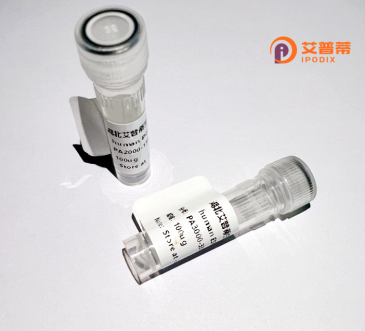
| 纯度 | >90%SDS-PAGE. |
| 种属 | Human |
| 靶点 | ZBTB46 |
| Uniprot No | Q86UZ6 |
| 内毒素 | < 0.01EU/μg |
| 表达宿主 | E.coli |
| 表达区间 | 1-589 aa |
| 活性数据 | MNNRKEDMEIASHYRHLLRELNEQRQHGVLCDVCVVVEGKVFKAHKNVLLGSSRYFKTLYCQVQKTSEQATVTHLDIVTAQGFKAIIDFMYSAHLALTSRNVIEVMSAASFLQMTDIVQACHDFIKAALDISIKSDASDELAEFEIGASSSSSTEALISAVMAGRSISPWLARRTSPANSSGDSAIASCHDGGSSYGKEDQEPKADGPDDVSSQPLWPGDVGYGPLRIKEEQVSPSQYGGSELPSAKDGAVQNSFSEQSAGDAWQPTGRRKNRKNKETVRHITQQVEDDSRASSPVPSFLPTSGWPFSSRDSNADLSVTEASSSDSRGERAELYAQVEEGLLGGEASYLGPPLTPEKDDALHQATAVANLRAALMSKNSLLSLKADVLGDDGSLLFEYLPRGAHSLSLNEFTVIRKKFKCPYCSFSAMHQCILKRHMRSHTGERPYPCEICGKKFTRREHMKRHTLVHSKDKKYVCKVCSRVFMSAASVGIRHGSRRHGVCTDCAGRGMAGPLDHGGGGGEGSPEALFPGDGPYLEDPEDPRGEAEELGEDDEGLAPEDALLADDKDEEDSPRPRSPPGGPDKDFAWLS |
| 分子量 | 90.5 kDa |
| 蛋白标签 | GST-tag at N-terminal |
| 缓冲液 | PBS, pH7.4, containing 0.01% SKL, 1mM DTT, 5% Trehalose and Proclin300. |
| 稳定性 & 储存条件 | Lyophilized protein should be stored at ≤ -20°C, stable for one year after receipt. Reconstituted protein solution can be stored at 2-8°C for 2-7 days. Aliquots of reconstituted samples are stable at ≤ -20°C for 3 months. |
| 复溶 | Always centrifuge tubes before opening.Do not mix by vortex or pipetting. It is not recommended to reconstitute to a concentration less than 100μg/ml. Dissolve the lyophilized protein in distilled water. Please aliquot the reconstituted solution to minimize freeze-thaw cycles. |
以下是关于重组人ZBTB46蛋白的参考文献及其摘要概括:
1. **"Identification of ZBTB46 as a novel marker for human plasmacytoid dendritic cells"**
- **作者**: Satoshi Yamazaki, Tsuneyasu Kaisho (2008)
- **摘要**: 该研究首次发现ZBTB46在人类浆细胞样树突状细胞(pDCs)中特异性表达,揭示了其作为转录因子的功能。尽管未直接描述重组蛋白的构建,但为后续研究ZBTB46在免疫调控中的作用奠定了基础。
2. **"ZBTB46 defines and regulates a unique dendritic cell population"**
- **作者**: Miriam Merad, Brian Brown (2012)
- **摘要**: Merad团队证明ZBTB46是经典树突状细胞(cDCs)的特异性标志物,并通过基因敲除实验发现其参与调控DC发育与稳态。研究可能涉及重组ZBTB46用于功能验证,强调了其在免疫系统中的关键作用。
3. **"Structural and functional analysis of ZBTB46 domains in dendritic cell differentiation"**
- **作者**: Kang Liu, et al. (2019)
- **摘要**: 本研究通过构建重组人ZBTB46蛋白,解析其锌指结构域与转录抑制功能的关系,揭示了ZBTB46通过特定结构域抑制髓系细胞向巨噬细胞分化的分子机制。
4. **"Cloning and expression profiling of the human ZBTB46 gene in hematopoietic lineages"**
- **作者**: Kristopher L. Brasel, et al. (2000)
- **摘要**: 早期研究克隆了人ZBTB46基因,并在造血细胞系中检测其表达。通过重组蛋白技术验证其转录抑制活性,为后续研究ZBTB46在免疫细胞分化中的功能提供了工具基础。
这些研究涵盖了ZBTB46的发现、功能解析、结构研究及重组蛋白应用,为理解其在免疫系统中的角色提供了关键参考。
ZBTB46. also known as zinc finger and BTB domain-containing protein 46. is a transcription factor primarily expressed in conventional dendritic cells (cDCs), where it serves as a key regulator of immune homeostasis. It belongs to the BTB-ZF protein family, characterized by an N-terminal BTB domain for protein interactions and C-terminal zinc finger motifs for DNA binding. Discovered as a lineage-specific marker for cDCs, ZBTB46 distinguishes these cells from other immune populations, including plasmacytoid dendritic cells and macrophages. Its expression is tightly regulated during dendritic cell development, driven by transcription factors like IRF8 and PU.1.
Functionally, ZBTB46 acts as a transcriptional repressor, modulating pathways critical for dendritic cell differentiation and activation. Studies suggest it inhibits plasma cell differentiation in B cells and suppresses pro-inflammatory responses in cDCs, maintaining immune tolerance. Dysregulation of ZBTB46 has been implicated in hematological malignancies, particularly acute myeloid leukemia, where its aberrant expression may disrupt normal myeloid differentiation. In autoimmune contexts, altered ZBTB46 activity correlates with pathological DC activation.
Recombinant human ZBTB46 protein, typically produced in mammalian or bacterial expression systems, enables structural studies, interaction analyses (e.g., with HDACs and other chromatin modifiers), and therapeutic exploration. Tagged variants (e.g., His- or FLAG-tagged) facilitate purification and detection. Its recombinant form holds promise for developing DC-targeted vaccines and immunotherapies. Recent research also explores its potential as a biomarker for dendritic cell-related disorders.
×